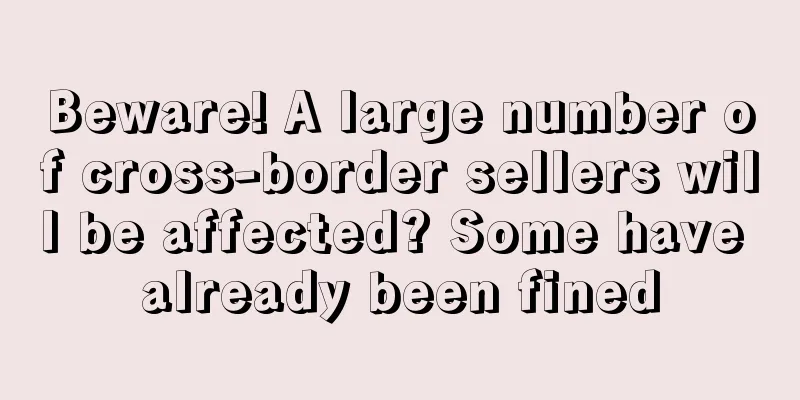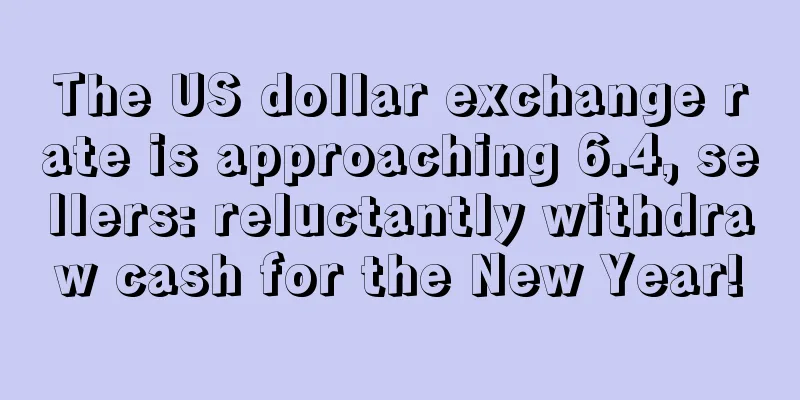Beware! A large number of cross-border sellers will be affected? Some have already been fined

|
Compliance is imperative!
Cross-border e-commerce is favored by consumers around the world for its unique advantages of low cost, high efficiency and breaking through time and space constraints. Recently, the "2022-2023 China Cross-border Export E-commerce Industry Development Status and Typical Case Study Report" released by iMedia Consulting shows that the scale of China's cross-border e-commerce exports in 2021 is 1.44 trillion yuan, and it is expected to reach 2.95 trillion yuan in 2024, which will double compared to 2021.
The entire cross-border e-commerce industry is developing at a high speed, and the era of "wild growth" is gradually coming to an end in this process. Compliance operations have become the only way for export companies to achieve long-term development. This not only means that in the process of operating stores such as Amazon, white hat operations must be adhered to, and illegal activities such as false orders and selling infringing products must not be engaged in, but also includes a point that is often overlooked by sellers - financial and tax compliance.
The recently widely discussed Golden Tax Phase IV is interpreted by industry insiders as having a significant impact on cross-border export sellers! In fact, tax compliance issues have always existed, and many cross-border sellers have faced large fines for this reason.
What impact will the fourth phase of the Golden Tax System have on cross-border sellers?
I believe that many cross-border sellers already know that the fourth phase of the Golden Tax System is actually an iterative upgrade of the third phase of the Golden Tax System. Its biggest feature is the enterprise information network verification system. The system has established a channel for information sharing and verification between various ministries, the People's Bank of China, banks and other participating institutions, and has realized the three major functions of verifying the mobile phone numbers of relevant personnel of enterprises, the tax status of enterprises, and the registration information of enterprises. In other words, big data is used to manage taxes, and non-tax businesses are included in the scope of analysis and monitoring, making the business more diversified.
After the launch of the fourth phase of the Golden Tax System, the monitoring of funds will be stricter, especially for personal account transactions . As we all know, cross-border e-commerce payment collection mainly includes two modes, the mode based on commercial banks and the mode based on third-party payment platforms. In terms of the third-party payment platform mode, many cross-border sellers have the problem of directly withdrawing funds to domestic personal bank cards.
Therefore, some industry insiders say that the fourth phase of the Golden Tax will have a significant impact on a large number of cross-border export sellers, which is specifically reflected in the following four aspects: income tax risk, value-added tax risk, zero declaration risk and foreign exchange collection and settlement risk.
A service provider said that the fourth phase of the Golden Tax System means that the era of pure zero declaration is a thing of the past. He also said that the focus of the investigation in 2023 will be on companies that have income but do not report it. Moreover, it is not enough to just report zero without doing accounting. If the company wants to increase shareholders or transfer or cancel the business in the future, it cannot do it without an account book. It is not clear whether this statement is completely true, but it is certain that if the business funds of the company enter the personal account through private-to-private means, not only will the company be suspected of tax evasion and tax evasion, but once it is audited, it will need to pay back taxes, and the funds collected by personal cards will also be regarded as personal income and need to pay individual taxes. Figure 1 "In the future, opening accounts under false names or opening fake accounts will most likely not work , and using private accounts to evade taxes will also not work, " said a cross-border seller. Many of his stores use personal payment methods, and his peers also have this situation. Those who have overseas stores use personal payment methods abroad. Although there is no situation of tax collection around him, he is always worried that problems will arise one day.
Tax compliance is imperative, what should sellers do?
Tax compliance is imperative, but many cross-border companies have not been able to find a compliant and legal solution. In this regard, Shanwei Guoguo Tonghong, manager, said that in the face of tax policies such as the fourth phase of the Golden Tax, enterprises in the comprehensive pilot zone can adopt the method of exporting without invoices, which can be used at ports across the country; they can also combine goods with traditional general trade. It is worth noting that the policy of purchasing without invoices is currently only available in the market procurement pilot and the comprehensive pilot zone pilot.
It is understood that the traditional model of enterprises is against the principle of "whoever exports should collect the foreign exchange" in terms of no tax refund without invoice. They do not make export declarations for a long time, collect foreign exchange in private accounts, and have a high risk of paying back income tax.
In fact, individual industrial and commercial households can transform into market procurement export agents, collect and settle foreign exchange independently, and declare personal income tax independently; or limited liability companies /individual industrial and commercial households can transform into cross-border e-commerce export agents, collect and settle foreign exchange independently, and declare income tax in a unified manner according to the assessed collection method.
For tax refund and exemption with invoices, the traditional model is general trade self-operated export , which requires the applicant to be a general taxpayer, have import and export qualifications, and have complete invoices.
A better approach is actually for general taxpayers to transform general trade self-operated exports into cross-border e-commerce self-operated exports, and those who meet the conditions can enjoy e-commerce export subsidies; or for small-scale taxpayers to transform general trade agency exports into cross-border e-commerce agency exports, and those who meet the conditions can enjoy quick tax refunds.
In addition, some finance and taxation institutions will also use the Hong Kong company structure to do tax planning for enterprises. There is no problem with the structure, but this model is not suitable for small sellers, and the seller's funds are still overseas, and many operational steps have security risks.
An Amazon seller added that many cross-border sellers now have offshore accounts in Hong Kong, especially big sellers. This can only achieve dispersed accounting. If some operations are not fully compliant, they may face consequences such as fines in the future.
Even without the Golden Tax Phase IV, sellers still need to do a good job of tax compliance. Banks have always monitored personal cards. If the card is used by a legal person or shareholder, and the amount of private transfers is too large, it will be suspended. However, the intensity is not as great as after the full implementation of the Golden Tax Phase IV. After the release of the Golden Tax Phase IV, the relevant popular science work has been intensified, and taxation has become more and more standardized. Many cross-border sellers have realized that some of their previous operations were not standardized.
"Many cross-border sellers have always had the misunderstanding that they do not know that they should declare exports, and even think that they do not need to pay taxes in China if they operate foreign stores . In fact , even if they are engaged in cross-border e-commerce , it is domestic enterprises that are exporting , so they need to pay taxes. Manager Hong said that in fact, no invoice purchases are only purchased when they have to pay for export or do 1039 exports . Otherwise , it is either self-operated export ( self-operated export refers to 0110 general trade export in foreign trade ) or agent export. However, many sellers engaged in cross-border e-commerce do not have this knowledge . They do not know that they should act as export agents even if they do not have import and export qualifications . When they hear the service provider say that the goods will be delivered to them and they don't need to worry about anything else , they think this is the right way .
Of course, there are also some cross-border sellers who know that their operations are not standardized, but in order to avoid taxes, they deliberately make zero declarations , use private accounts to avoid taxes and other illegal behaviors. For this reason, many cross-border companies have received penalties from relevant departments.
A cross-border company in Jiangsu is an example. It is understood that from January to June 2022, a cross-border company in Jiangsu sold motors by issuing receipts, and the payment was collected in cash, with a total unrecorded and undeclared sales amount of 9,920.17 (excluding tax). From January to June 2022, motors were sold through the cross-border e-commerce platform eBay, and the payment was collected in US dollars by a third-party payment collection company Ying, with a total unrecorded and undeclared sales amount of 129,784.62 (excluding tax) in RMB. The above total undeclared sales amount reached 139,704.79 yuan (excluding tax). Therefore, when the cross-border company was subject to a tax audit, it not only had to pay additional taxes, but also faced a lot of fines.
It is foreseeable that as the enforcement of the Golden Tax Phase IV becomes more and more stringent, more similar news will be exposed in the future. This also serves as a wake-up call for the majority of cross-border sellers. While striding forward, they must do a good job in tax compliance, avoid risks, and operate safely. |
<<: 200+ sellers’ goods were detained, and the freight forwarder was fined over 10 million
>>: Shenzhen's popular Aoji brand has made another big move! Seller: The leeks are coming
Recommend
Insufficient income! Are Amazon workers in the United States still living below the poverty line?
In separate letters to Amazon CEO Andy Jassy, D...
Popular toys are sued crazily! Multiple platform accounts are affected and the seller’s 2 million funds are frozen
Popular toys that are all the rage on the interne...
TikTok launches new e-commerce feature
As ByteDance increases its investment in cross-bo...
Cainiao Network and Lazada launch direct flights to East Malaysia to strengthen cross-border logistics
Yesterday, according to "POST&PARCEL&quo...
Will speed up delivery! GS Shopping Korea acquires 19.53% stake in Mesh Korea
Mesh Korea, a logistics company operating the log...
What is MEIG? MEIG Review, Features
MEIG (The Middle East Internet Group) was establis...
More health-conscious? The latest UK consumer trends influence these areas...
New research from shopping centre giant Unibail-R...
What is Tommy John? Tommy John Review, Features
Tommy John is an American apparel company that pr...
The actual controller of Shenzhen Damai's parent company is under investigation
When it comes to Shenzhen Big Selling Chain, peop...
More than 80% of Americans shop on Prime Day, and these products will explode
Ever since the date of Amazon Prime Day was annou...
The demand for pet supplies surges again, and pet owners say: I’ll buy them even if they’re expensive!
Recently, pet owners in the United States are suf...
What is D1 Brands? D1 Brands Review, Features
D1 Brands is a team of experienced Amazon third-p...
What is Email Hunter? Email Hunter Review, Features
When searching for influencers, a common problem ...
Capturing the joy of childhood, CAMP launches children's e-commerce platform
As shopping moves online and cash becomes less av...
With frequent capital financing, is a wave of acquisitions of Amazon's third-party sellers coming?
Amazon third-party acquirer Elevate Brands announ...









